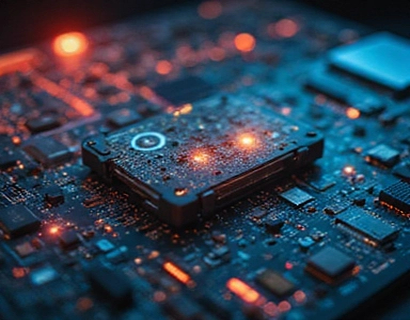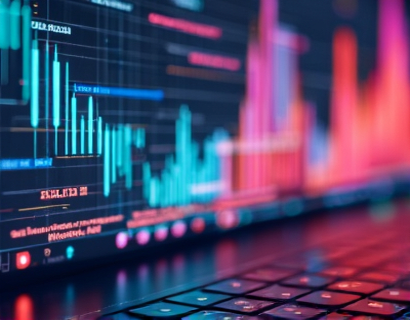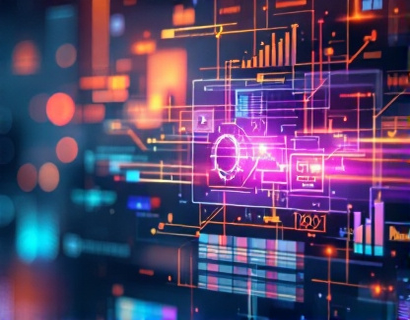AI and Crypto: Pioneering Financial Innovation for the Digital Age
The intersection of artificial intelligence (AI) and cryptocurrency is redefining the landscape of digital finance. This fusion represents a groundbreaking shift, offering unprecedented opportunities for innovation and efficiency in financial interactions. As we delve into this transformative domain, it's essential to understand how AI is enhancing the crypto ecosystem and what this means for the future of FinTech.
The crypto space has always been at the forefront of technological advancements, embracing blockchain technology to create decentralized, secure, and transparent financial systems. However, the integration of AI takes this evolution to a new level. AI's capabilities in data analysis, pattern recognition, and predictive modeling are being harnessed to optimize various aspects of cryptocurrency operations, from trading and risk management to security and user experience.
Enhancing Trading Strategies with AI
One of the most significant impacts of AI on crypto is in the realm of trading. Traditional trading relies heavily on human analysis and decision-making, which can be limited by cognitive biases and the inability to process vast amounts of data in real-time. AI algorithms, on the other hand, can analyze market data from multiple sources, identify patterns, and make predictions with a level of speed and accuracy unattainable by humans.
Automated trading bots powered by AI are becoming increasingly popular among crypto traders. These bots can execute trades 24/7, adapt to market conditions, and follow sophisticated strategies based on predefined parameters. For instance, machine learning models can be trained to recognize profitable trading opportunities by analyzing historical price data, trading volumes, and market sentiment. This not only enhances the efficiency of trading but also reduces emotional decision-making, a common pitfall for human traders.
Risk Management and Portfolio Optimization
Risk management is a critical component of any financial endeavor, and AI brings significant advancements to this area in the crypto space. AI algorithms can assess and mitigate risks by continuously monitoring market conditions, evaluating asset correlations, and adjusting portfolio allocations in real-time. This dynamic approach ensures that investments remain optimized for both risk and return.
Portfolio optimization is another area where AI shines. By leveraging advanced algorithms, AI can analyze a vast array of factors, including asset performance, market trends, and economic indicators, to create diversified and balanced portfolios. This is particularly valuable in the volatile crypto market, where diversification is key to managing risk. AI-driven portfolio management tools can also provide personalized recommendations based on an individual's risk tolerance and investment goals, making sophisticated investment strategies accessible to a broader audience.
Security Enhancements through AI
Security is a paramount concern in the crypto world, given the decentralized and often anonymous nature of transactions. AI plays a crucial role in enhancing security measures by detecting and preventing fraudulent activities. Machine learning algorithms can analyze transaction patterns to identify anomalies that may indicate fraudulent behavior, such as wash trades or pump-and-dump schemes. These systems can alert users and platform administrators in real-time, enabling swift action to mitigate potential losses.
Additionally, AI can improve the security of private keys and wallet management. Biometric authentication, powered by AI, offers a more secure and convenient way to access crypto assets. Voice recognition, facial recognition, and fingerprint scanning, when integrated with AI, provide robust security measures that are difficult to compromise. This not only protects user assets but also enhances the overall trust in the crypto ecosystem.
User Experience and Interface Improvements
The complexity of crypto platforms can be daunting for new users, often leading to a steep learning curve. AI-driven user interface (UI) and user experience (UX) designs are revolutionizing how users interact with crypto services. AI can analyze user behavior and preferences to create personalized interfaces that simplify navigation and enhance usability. For example, AI can recommend relevant features based on a user's activity, provide context-sensitive help, and even predict user needs before they are explicitly stated.
Chatbots powered by natural language processing (NLP), a subset of AI, are becoming common in crypto platforms. These chatbots can assist users with a wide range of tasks, from answering frequently asked questions to guiding them through complex processes like setting up a wallet or executing a trade. This not only improves the user experience but also reduces the workload on human support teams, allowing them to focus on more complex issues.
Market Analysis and Sentiment Analysis
Understanding market sentiment is crucial for making informed investment decisions. AI-powered tools can analyze vast amounts of data from social media, news articles, and financial reports to gauge public sentiment towards specific assets. Sentiment analysis algorithms can detect positive or negative emotions and trends, providing valuable insights that can inform trading strategies. This data-driven approach to market analysis can help traders and investors make more accurate predictions and timely decisions.
Furthermore, AI can process and interpret alternative data sources, such as web search trends, social media activity, and economic indicators, to provide a comprehensive view of market conditions. This holistic approach to market analysis goes beyond traditional financial metrics, offering a more nuanced understanding of market dynamics.
Decentralized Finance (DeFi) and AI
The rise of DeFi has opened new frontiers in the crypto space, and AI is playing a pivotal role in this evolution. DeFi platforms leverage blockchain technology to create decentralized financial services, including lending, borrowing, and yield farming. AI enhances these services by providing sophisticated risk assessment tools, automated loan underwriting, and optimized yield strategies.
For instance, AI can evaluate the creditworthiness of borrowers in decentralized lending platforms by analyzing a wide range of data points, from financial history to social media activity. This allows for more inclusive and efficient credit allocation. Additionally, AI-driven portfolio management in DeFi can optimize yield strategies by dynamically reallocating assets based on market conditions and user preferences.
Challenges and Considerations
While the integration of AI in the crypto space offers numerous benefits, it also presents challenges that need to be addressed. One of the primary concerns is the regulatory landscape. As AI and crypto continue to evolve, regulators are grappling with how to oversee these innovative technologies. Ensuring compliance with existing regulations while fostering innovation is a delicate balance that requires collaboration between tech companies, regulators, and policymakers.
Another challenge is the ethical use of AI. The deployment of AI in finance must be guided by ethical principles to prevent biases and ensure fairness. For example, AI algorithms used in credit scoring or loan approval should be transparent and free from discriminatory biases. Continuous monitoring and auditing of AI systems are essential to maintain trust and integrity in the crypto ecosystem.
Future Prospects
The future of AI and crypto is bright, with numerous potential developments on the horizon. As AI technology advances, we can expect even more sophisticated tools and applications in the crypto space. One area of interest is the integration of AI with quantum computing, which could revolutionize data processing capabilities and further enhance the efficiency of AI-driven financial solutions.
Moreover, the convergence of AI, blockchain, and the Internet of Things (IoT) could lead to the creation of smart financial systems that automate and optimize a wide range of financial processes. From smart contracts that execute automatically based on predefined conditions to IoT devices that provide real-time data for AI-driven decision-making, the possibilities are vast.
In conclusion, the fusion of AI and crypto is transforming the financial landscape, offering innovative solutions that enhance efficiency, security, and user experience. As this field continues to evolve, it's crucial for tech enthusiasts, innovators, and financial professionals to stay informed and embrace these advancements to navigate the future of FinTech effectively.










































